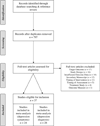Preventing postpartum depression: a meta-analytic review
- PMID: 24211712
- PMCID: PMC4104584
- DOI: 10.1016/j.cpr.2013.10.004
Preventing postpartum depression: a meta-analytic review
Abstract
This meta-analysis assessed the efficacy of a wide range of preventive interventions designed to reduce the severity of postpartum depressive symptoms or decrease the prevalence of postpartum depressive episodes. A systematic review identified 37 randomized or quasi-randomized controlled trials in which an intervention was compared to a control condition. Differences between treatment and control conditions in the level of depressive symptoms and prevalence of depressive episodes by 6 months postpartum were assessed in separate analyses. Depressive symptoms were significantly lower at post-treatment in intervention conditions, with an overall effect size in the small range after exclusion of outliers (Hedges' g=0.18). There was a 27% reduction in the prevalence of depressive episodes in intervention conditions by 6 months postpartum after removal of outliers and correction for publication bias. Later timing of the postpartum assessment was associated with smaller differences between intervention and control conditions in both analyses. Among studies that assessed depressive symptoms using the EPDS, higher levels of depressive symptoms at pre-treatment were associated with smaller differences in depressive symptoms by 6 months postpartum. These findings suggest that interventions designed to prevent postpartum depression effectively reduce levels of postpartum depressive symptoms and decrease risk for postpartum depressive episodes.
Keywords: Meta-analysis; Postpartum depression; Prevention.
© 2013.
Figures



References
-
- Armstrong KL, Fraser JA, Dadds MR, Morris J. A randomized, controlled trial of nurse home visiting to vulnerable families with newborns. Journal of Paediatrics and Child Health. 1999;35:237–244. - PubMed
-
- Austin MP, Frilingos M, Lumley J, Hadzi-Pavlovic D, Roncolato W, Acland S, et al. Brief antenatal cognitive behavior therapy group intervention for the prevention of postnatal depression and anxiety: A randomized controlled trial. Journal of Affective Disorders. 2008;105:35–44. - PubMed
-
- Battle CL, Uebelacker LA, Howard M, Castaneda M. Prenatal yoga and depression during pregnancy. Birth: Issues in Perinatal Care. 2010;37:353–354. - PubMed
-
- Beal DJ, Corey DM, Dunlap WP. On the bias of Huffcutt and Arthur’s (1995) procedure for identifying outliers in the meta-analysis of correlations. Journal of Applied Psychology. 2002;87:583–589. - PubMed
-
- Beck C. Predictors of postpartum depression: An update. Nursing Research. 2001;50:275–285. - PubMed
Publication types
MeSH terms
Grants and funding
LinkOut - more resources
Full Text Sources
Other Literature Sources
Medical

